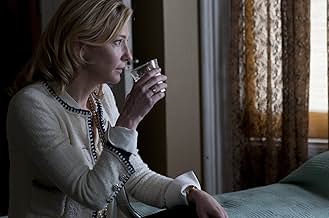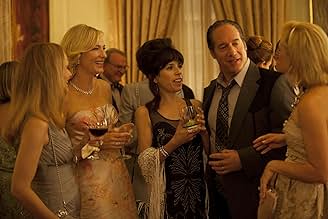Uma jovem de Nova Iorque, profundamente perturbada e em negação, chega a San Francisco para impor-se a sua irmã.Uma jovem de Nova Iorque, profundamente perturbada e em negação, chega a San Francisco para impor-se a sua irmã.Uma jovem de Nova Iorque, profundamente perturbada e em negação, chega a San Francisco para impor-se a sua irmã.
- Ganhou 1 Oscar
- 56 vitórias e 83 indicações no total
Avaliações em destaque
Sometimes it feels like Woody Allen is deliberately hit and miss. Every other film appears to be a winner so it's become easy to just skip the mediocre ones. I thought Midnight In Paris was pretty good but I felt like its idea wasn't explored well enough and it became too repetitive. Blue Jasmine is a film that feels like it'll be another basic story at first then as the tragedy slowly unravels, it becomes all the more fascinating. At first the film's structure of flashbacking without transition is a little frustrating as the present time doesn't give you much to chew on in the first place, but it soon becomes clear that this was the only way to tell this brilliant and complex story of a woman's place in the world. Cate Blanchett is setting the reviews on fire and she certainly deserves it. I've always loved her engrossing theatrical style in films like The Aviator and The Curious Case of Benjamin Button and I've missed her since.
Here she is in full force as she switches from glamour to glare seamlessly and effortlessly. Blanchett has often played strong women and she tiptoes the line of Jasmine's strength and vulnerability both with and without sympathy. It's incredible to watch. Although I was concerned I was going to only appreciate the performance and not connect with the character, I ended up finding her struggle to feel useful in the working world and not knowing how to achieve her ambitions to cut deep into the first world human anxieties about identity and self- worth. It's great to have a film that addresses those issues so earnestly, without feeling self- pitying. Although the spotlight is on her, there's plenty of room for the supporting players to shine with the delightful comic relief performances from Louis C.K., Michael Stuhlberg and Max Casella and deceptively charming performances from Alec Baldwin, Andrew Dice Clay and Peter Sarsgaard. The real talent on the side belongs to Sally Hawkins and Bobby Cannavale who give compelling and heartbreaking performances.
I like how Allen has such confidence in his shooting style of simple wides and closeups that he doesn't let it get in the way of the story but sometimes it does feel bland rather than just Woody's brand. It sometimes feels like the story is taking uninteresting broad strokes with its archetypes but when the details come in like a mystery novel, they enrichen the story and leave just before they drown you making you want more. Perhaps Allen could've made a better job of making me intrigued in the details but that makes the pay-offs all the more sweeter. However, I'm not quite sure what to make of the ending, perhaps Allen is trying to say there's some people who can and can't be fixed, I'm not sure, but it's a fascinating tragic comic tale nonetheless. Maybe it's intended as a punishment film regarding the sin of greed. That would make sense though it wouldn't be as satisfying. It's been compared to A Streetcar Named Desire a lot but I don't remember much of that story despite having seen it twice. I think I prefer Blue Jasmine. One of Allen's most unsuspecting heavyweight films in a long time.
8/10
Here she is in full force as she switches from glamour to glare seamlessly and effortlessly. Blanchett has often played strong women and she tiptoes the line of Jasmine's strength and vulnerability both with and without sympathy. It's incredible to watch. Although I was concerned I was going to only appreciate the performance and not connect with the character, I ended up finding her struggle to feel useful in the working world and not knowing how to achieve her ambitions to cut deep into the first world human anxieties about identity and self- worth. It's great to have a film that addresses those issues so earnestly, without feeling self- pitying. Although the spotlight is on her, there's plenty of room for the supporting players to shine with the delightful comic relief performances from Louis C.K., Michael Stuhlberg and Max Casella and deceptively charming performances from Alec Baldwin, Andrew Dice Clay and Peter Sarsgaard. The real talent on the side belongs to Sally Hawkins and Bobby Cannavale who give compelling and heartbreaking performances.
I like how Allen has such confidence in his shooting style of simple wides and closeups that he doesn't let it get in the way of the story but sometimes it does feel bland rather than just Woody's brand. It sometimes feels like the story is taking uninteresting broad strokes with its archetypes but when the details come in like a mystery novel, they enrichen the story and leave just before they drown you making you want more. Perhaps Allen could've made a better job of making me intrigued in the details but that makes the pay-offs all the more sweeter. However, I'm not quite sure what to make of the ending, perhaps Allen is trying to say there's some people who can and can't be fixed, I'm not sure, but it's a fascinating tragic comic tale nonetheless. Maybe it's intended as a punishment film regarding the sin of greed. That would make sense though it wouldn't be as satisfying. It's been compared to A Streetcar Named Desire a lot but I don't remember much of that story despite having seen it twice. I think I prefer Blue Jasmine. One of Allen's most unsuspecting heavyweight films in a long time.
8/10
I confess, I don't usually enjoy Woody Allen movies. There's too much fretting about relationships, and there's too much talking. This, however, was an unexpected, pleasant surprise. The key to the plot all devolves from Jasmine's marriage to a New York financial whiz of questionable integrity. Alec Baldwin hits the part out of the park which allows the movie to spend its quality time exploring the toxic relationship to wealth some people have.
The second most salient plot element is Jasmine's adoptive sister, Ginger, played by Sally Hawkins, who is as unforgettably effective as the other leads. As a guy, I've known women exactly like her, and I would be surprised if any woman in the audience didn't. The interaction between Ginger and Jasmine keeps the entire movie roiling. It involves her sister taking Jasmine in despite her having looked down on her since she became rich.
We're also treated to excellent performances in smaller roles by Andrew Dice Clay, and, my favorite, Bobby Cannavale, as Ginger's boyfriend, Chili. There's even more to be said about the acting than just these standouts that I won't include for the sake of brevity, but suffice it to say, it's all top notch.
The real payoff here is what Mr Allen is choosing to depict of those whose life is overly dependent on wealth. Woody Allen had always seemed fairly indifferent to wealth to me, so I imagined he wanted to protect those who had it, which put me off. But that's not the case here. Mr Allen is quite pointed about what's out there in terms of financial hazards, and how it can destroy lives.
As to Cate Blanchett there is something odd going on with her in this movie. I've seen many great performances by actresses, in particular, but never one that seemed as if the actress was somehow only devoting maybe 90% of her skill to a difficult role, and still she pulls it off brilliantly! That missing 10% is somehow not acting and with us, the audience, as her real self, quite conscious of the moment, and it's like spending time with an attractive woman. It's almost as if we're also actors and she's showing us only enough for us to see what she's capable of. She thinks she can trust us to understand where she's taking her performance, and somehow it works. This is the most wonderful acting by an actress I've seen this winter, a real delight, and I can't imagine her being bested at the Oscars.
So, in short, I'm surprised to find that this is my favorite Woody Allen movie for a variety of reasons, and I highly recommend it.
The second most salient plot element is Jasmine's adoptive sister, Ginger, played by Sally Hawkins, who is as unforgettably effective as the other leads. As a guy, I've known women exactly like her, and I would be surprised if any woman in the audience didn't. The interaction between Ginger and Jasmine keeps the entire movie roiling. It involves her sister taking Jasmine in despite her having looked down on her since she became rich.
We're also treated to excellent performances in smaller roles by Andrew Dice Clay, and, my favorite, Bobby Cannavale, as Ginger's boyfriend, Chili. There's even more to be said about the acting than just these standouts that I won't include for the sake of brevity, but suffice it to say, it's all top notch.
The real payoff here is what Mr Allen is choosing to depict of those whose life is overly dependent on wealth. Woody Allen had always seemed fairly indifferent to wealth to me, so I imagined he wanted to protect those who had it, which put me off. But that's not the case here. Mr Allen is quite pointed about what's out there in terms of financial hazards, and how it can destroy lives.
As to Cate Blanchett there is something odd going on with her in this movie. I've seen many great performances by actresses, in particular, but never one that seemed as if the actress was somehow only devoting maybe 90% of her skill to a difficult role, and still she pulls it off brilliantly! That missing 10% is somehow not acting and with us, the audience, as her real self, quite conscious of the moment, and it's like spending time with an attractive woman. It's almost as if we're also actors and she's showing us only enough for us to see what she's capable of. She thinks she can trust us to understand where she's taking her performance, and somehow it works. This is the most wonderful acting by an actress I've seen this winter, a real delight, and I can't imagine her being bested at the Oscars.
So, in short, I'm surprised to find that this is my favorite Woody Allen movie for a variety of reasons, and I highly recommend it.
"Who do you have to sleep with around here to get a Stoli martini with a twist of lemon?"
Woody Allen has returned to the States for this film after experiencing some extended vacations over Europe (To Rome with Love, Midnight in Paris, You Will Meet a Tall Dark Stranger, and Vicky Cristina Barcelona), and this time the story takes place mostly in San Francisco, although we do get several interesting flashbacks in New York (Allen's favorite filming location). I mention these locations because in most of his films these cities are actual characters and sometimes even main ones. There were two general criticisms I had read about Blue Jasmine before watching it, one was that this was Woody Allen's return to form and the second was that Cate Blanchett's performance was magnificent. I agree with the second statement because Blanchett delivers one of the best performances of the year and she is the main reason why this film actually worked for me. As for the second statement I have to differ because I thought Midnight in Paris was his best recent film and I enjoyed it much more than Blue Jasmine. I do have to say that Woody Allen's capacity for writing and directing these films in such a short period of time (he's directed one every year for the past decades) impresses me. He has a unique voice in all of his films that sometimes make me picture him talking through each one of his characters. I remember something similar happening to me during college when I would be reading over my notes as I studied for a final exam actually listening to my professors unique voice in my head as I read. This is what happens to me often during a Woody Allen film as I imagine his head popping over one of his characters. It happened during this film as well, except for Blanchett's character who managed to bring her unique style which took a voice of its own. She deserves all the accolades she's been receiving from her peers and critics alike. It was a wonderful performance and an affecting one as well.
Jasmine (Cate Blanchett) was a New York socialite who lived a happy and blessed life with her husband Hal (Alec Baldwin), until he was sent to prison for fraudulent business acts. We get to discover some darker secrets about their past as the story unravels through flashbacks, but the film opens at the present as Jasmine is returning to San Francisco to live with her sister, Ginger (Sally Hawkins) and her two sons, completely broke. She has experienced several mental breakdowns due to her traumatic past, and despite being estranged from her sister during that time, Ginger takes her in. Jasmine imposes on Ginger who wasn't as blessed as she was and is working at a grocery store while dating Chili (Bobby Canavale). Jasmine and Chili don't get along too well as she has interfered in his plans to move in with Ginger. Jasmine is always telling her that she should find someone better like she did (which wasn't really the case) and that is the reason for the constant friction between them. In San Francisco, Jasmine meets another wealthy man named Dwight (Peter Saarsgard) who she begins dating, and which gives her hope that she will recover her past glory, but her constant lies begin catching up with her affecting her relationship with him and her sister.
I wouldn't say this is a character driven story because I felt a lot of them were one dimensional characters, with the exception of Jasmine of course. The people in Woody Allen's films don't tend to feel real or authentic at times, and they usually are just cartoonish caricatures from a bubbled world. Allen's films aren't the laugh out loud type either, I find them funny in a rather witty way. He is slick at times and the scenes put a smile on your face, but they don't have you laughing hysterically. Blanchett does manage to portray Jasmine in a more authentic and believable way, showing her flaws and inner struggles with her mental illness. It's a character that we find hard to sympathize with, but also feel sorry for as her life begins falling apart. She's the type of person who cannot be on her own and is always depending on someone. I also liked the way in which Woody Allen told the story and let the past unravel smoothly through flashbacks revealing several things about her character. This along with Blanchett's performance is what saves the movie and makes it entertaining, but I wouldn't agree with the critics who are saying this is Allen's best work in years. I do agree it is perhaps his most tragic and darkest comedy in recent years.
http://estebueno10.blogspot.com/
Woody Allen has returned to the States for this film after experiencing some extended vacations over Europe (To Rome with Love, Midnight in Paris, You Will Meet a Tall Dark Stranger, and Vicky Cristina Barcelona), and this time the story takes place mostly in San Francisco, although we do get several interesting flashbacks in New York (Allen's favorite filming location). I mention these locations because in most of his films these cities are actual characters and sometimes even main ones. There were two general criticisms I had read about Blue Jasmine before watching it, one was that this was Woody Allen's return to form and the second was that Cate Blanchett's performance was magnificent. I agree with the second statement because Blanchett delivers one of the best performances of the year and she is the main reason why this film actually worked for me. As for the second statement I have to differ because I thought Midnight in Paris was his best recent film and I enjoyed it much more than Blue Jasmine. I do have to say that Woody Allen's capacity for writing and directing these films in such a short period of time (he's directed one every year for the past decades) impresses me. He has a unique voice in all of his films that sometimes make me picture him talking through each one of his characters. I remember something similar happening to me during college when I would be reading over my notes as I studied for a final exam actually listening to my professors unique voice in my head as I read. This is what happens to me often during a Woody Allen film as I imagine his head popping over one of his characters. It happened during this film as well, except for Blanchett's character who managed to bring her unique style which took a voice of its own. She deserves all the accolades she's been receiving from her peers and critics alike. It was a wonderful performance and an affecting one as well.
Jasmine (Cate Blanchett) was a New York socialite who lived a happy and blessed life with her husband Hal (Alec Baldwin), until he was sent to prison for fraudulent business acts. We get to discover some darker secrets about their past as the story unravels through flashbacks, but the film opens at the present as Jasmine is returning to San Francisco to live with her sister, Ginger (Sally Hawkins) and her two sons, completely broke. She has experienced several mental breakdowns due to her traumatic past, and despite being estranged from her sister during that time, Ginger takes her in. Jasmine imposes on Ginger who wasn't as blessed as she was and is working at a grocery store while dating Chili (Bobby Canavale). Jasmine and Chili don't get along too well as she has interfered in his plans to move in with Ginger. Jasmine is always telling her that she should find someone better like she did (which wasn't really the case) and that is the reason for the constant friction between them. In San Francisco, Jasmine meets another wealthy man named Dwight (Peter Saarsgard) who she begins dating, and which gives her hope that she will recover her past glory, but her constant lies begin catching up with her affecting her relationship with him and her sister.
I wouldn't say this is a character driven story because I felt a lot of them were one dimensional characters, with the exception of Jasmine of course. The people in Woody Allen's films don't tend to feel real or authentic at times, and they usually are just cartoonish caricatures from a bubbled world. Allen's films aren't the laugh out loud type either, I find them funny in a rather witty way. He is slick at times and the scenes put a smile on your face, but they don't have you laughing hysterically. Blanchett does manage to portray Jasmine in a more authentic and believable way, showing her flaws and inner struggles with her mental illness. It's a character that we find hard to sympathize with, but also feel sorry for as her life begins falling apart. She's the type of person who cannot be on her own and is always depending on someone. I also liked the way in which Woody Allen told the story and let the past unravel smoothly through flashbacks revealing several things about her character. This along with Blanchett's performance is what saves the movie and makes it entertaining, but I wouldn't agree with the critics who are saying this is Allen's best work in years. I do agree it is perhaps his most tragic and darkest comedy in recent years.
http://estebueno10.blogspot.com/
Woody Allen's finely tuned screen-writing skills and his talent for eliciting standout and often award-winning performances from his leading ladies are on full display in "Blue Jasmine." Alec Baldwin, the slick husband of a middle-aged socialite, Cate Blanchett, pulls a Bernie-Madoff swindle and ends up in jail. The homes, the cars, the furs, the jewels, the furniture all go to the Feds, and the penniless Cate flies first class to San Francisco with her Louis Vuitton luggage to stay with her non-biological sister, Sally Hawkins, until she gets back on her feet. Blanchett, the Jasmine of the title, is totally unprepared for her economic fall. She decides to become an interior designer, but wants to study on-line; however, she is computer illiterate and must take a course, before she can begin to study decorating; but, she needs money for the courses and takes a receptionist job with a lecherous dentist. Although the film addresses serious issues, the Allen humor will provoke smiles and an occasional chuckle, from small well-observed moments such as the attempts of indecisive patients to make dental appointments.
Understandably, Cate Blanchett's Jasmine teeters on the edge of a nervous breakdown; she lies instinctively, even to herself; and she cannot or will not face the reality of her downward mobility. The role is an actress's showcase, and Blanchett is in top form; her nervous rambling monologues, either to herself or to unwilling strangers, provide a study guide for aspiring actors. Jasmine brays at her "sister," Ginger, effortlessly and engagingly played by Hawkins; she nags about Ginger's job, lover, and living quarters, until Ginger points out Jasmine's own diminished situation. Jasmine bellows that Ginger can do better than her amorous boyfriend, Chili, a charismatic Bobby Cannavale with a bad haircut and faded tattoo; eventually, Ginger reminds her that her own choice of husband was less than stellar. Jasmine, Ginger, and Chili make an aromatic trio, whose names perhaps allude to their personalities, and they are ably supported by Louis C.K., a horny guy with the hots for Ginger, and Peter Sarsgaard, a respectable diplomat seeking a suitable wife for his political career.
In keeping with the film's title, Woody uses blues on the soundtrack, and his cinematographer, Javier Aguirresrobe, lenses the dual New York and San Francisco locales effectively. Although the jump cuts in time are jarring initially, viewers will quickly accommodate to New York being the past and San Francisco the present. Woody at age 78 is a master writer, especially of women's characters, and "Blue Jasmine" finds him at his best. Although Woody's trademark humor flickers throughout, the film is essentially about a vulnerable woman standing amidst the ruins of her former life and facing a precariously uncertain future. Audiences may come out praising the performers, but humming the blues.
Understandably, Cate Blanchett's Jasmine teeters on the edge of a nervous breakdown; she lies instinctively, even to herself; and she cannot or will not face the reality of her downward mobility. The role is an actress's showcase, and Blanchett is in top form; her nervous rambling monologues, either to herself or to unwilling strangers, provide a study guide for aspiring actors. Jasmine brays at her "sister," Ginger, effortlessly and engagingly played by Hawkins; she nags about Ginger's job, lover, and living quarters, until Ginger points out Jasmine's own diminished situation. Jasmine bellows that Ginger can do better than her amorous boyfriend, Chili, a charismatic Bobby Cannavale with a bad haircut and faded tattoo; eventually, Ginger reminds her that her own choice of husband was less than stellar. Jasmine, Ginger, and Chili make an aromatic trio, whose names perhaps allude to their personalities, and they are ably supported by Louis C.K., a horny guy with the hots for Ginger, and Peter Sarsgaard, a respectable diplomat seeking a suitable wife for his political career.
In keeping with the film's title, Woody uses blues on the soundtrack, and his cinematographer, Javier Aguirresrobe, lenses the dual New York and San Francisco locales effectively. Although the jump cuts in time are jarring initially, viewers will quickly accommodate to New York being the past and San Francisco the present. Woody at age 78 is a master writer, especially of women's characters, and "Blue Jasmine" finds him at his best. Although Woody's trademark humor flickers throughout, the film is essentially about a vulnerable woman standing amidst the ruins of her former life and facing a precariously uncertain future. Audiences may come out praising the performers, but humming the blues.
It's a great and unexpected surprise when Woody can beat both the Coens and the French these days in a film about delusion and self. I'm not a fan of his overall trajectory and predilections, but I won't deny any film its effectiveness.
Woody here pierces through to the essential thing. It's a film about modern suffering but that is clearly seen here as attachment to internal narrative, not just a general thickness around being. He maintains inextricability; it is both her fault and a life of circumstance with no clean separation. The woman still carries echoes of that previous narrative around her, soon it becomes clear that the explanatory flashbacks are hallucinated after the fact.
Overall Woody here arrives at a tender admission. It would be all too easy to discard or condemn her as pampered and sheltered, this is only part of the thrust here. He doesn't romanticize privilege the way Sofia Coppola is prone to, another plus: we're called to sympathize with more than a victim. The admission is that life in its course of being lived leaves indelible marks in the story of who you are, that this is only real to the extend that you inhabit the story, and yet that's it's genuinely hard to distinguish one self from the other.
He doesn't give this internal world to us with particular visual richness, few filmmakers his age do. There is 'color and shape', tied to the narrator's vivid imagination who aspires to be an 'interior designer', but Woody could have done so much more with the logic of memory. No, the real effect here is geared in the combination of asking the multilayered Blanchett to inhabit a character who inhabits and continuously recalls a story. She's marvelous. She seems to know the degree to which Jasmine blurs the recalled story to be only about color and appearances is the same one to which she blurs the current one, true love from convenience, responsibility from mere absent-mindedness, all these Blanchett truly, genuinely blurs around the character she inhabits.
It's deceptively easy to consume this thinking Jasmine knew in advance or was never in love, be aware and sensitive to this difference. It blooms once you reflect back on it, inhabit her world instead of pass through with moral superiority, because doing this means that your own tools of defining truth must be called into judgement.
It's a fine film, much better than the hollow inhabiting of his Midnight. This one cuts. A Woman Under the Influence appears to have been a template, Jasmine's muttering to herself on the street is a reference. Like that film, it is as much the filmmaker's as the actresses' creation, impossible without the richness Blanchett fleshes with.
Woody here pierces through to the essential thing. It's a film about modern suffering but that is clearly seen here as attachment to internal narrative, not just a general thickness around being. He maintains inextricability; it is both her fault and a life of circumstance with no clean separation. The woman still carries echoes of that previous narrative around her, soon it becomes clear that the explanatory flashbacks are hallucinated after the fact.
Overall Woody here arrives at a tender admission. It would be all too easy to discard or condemn her as pampered and sheltered, this is only part of the thrust here. He doesn't romanticize privilege the way Sofia Coppola is prone to, another plus: we're called to sympathize with more than a victim. The admission is that life in its course of being lived leaves indelible marks in the story of who you are, that this is only real to the extend that you inhabit the story, and yet that's it's genuinely hard to distinguish one self from the other.
He doesn't give this internal world to us with particular visual richness, few filmmakers his age do. There is 'color and shape', tied to the narrator's vivid imagination who aspires to be an 'interior designer', but Woody could have done so much more with the logic of memory. No, the real effect here is geared in the combination of asking the multilayered Blanchett to inhabit a character who inhabits and continuously recalls a story. She's marvelous. She seems to know the degree to which Jasmine blurs the recalled story to be only about color and appearances is the same one to which she blurs the current one, true love from convenience, responsibility from mere absent-mindedness, all these Blanchett truly, genuinely blurs around the character she inhabits.
It's deceptively easy to consume this thinking Jasmine knew in advance or was never in love, be aware and sensitive to this difference. It blooms once you reflect back on it, inhabit her world instead of pass through with moral superiority, because doing this means that your own tools of defining truth must be called into judgement.
It's a fine film, much better than the hollow inhabiting of his Midnight. This one cuts. A Woman Under the Influence appears to have been a template, Jasmine's muttering to herself on the street is a reference. Like that film, it is as much the filmmaker's as the actresses' creation, impossible without the richness Blanchett fleshes with.
Você sabia?
- CuriosidadesBecause Woody Allen doesn't get into motivation or background of a character when he's directing actors, Cate Blanchett and Sally Hawkins got together and invented the background for the sisters' relationship. So every scene when they talked about their past, although it's vague on the script and for the viewer, they both knew exactly what the sisters are talking about.
- Erros de gravaçãoWhen Ginger, Jasmine, Chili and Eddie are at the clams restaurant, Eddie asks Jasmine what would she be if she had finished her education. She answers, "An anthropologist". Eddie ignorantly asks, "Really, digging up fossils?" Jasmine replies mockingly: "That's an archaeologist". She is wrong. The correct answer would be, "That's a paleontologist". Jasmine is belittling Eddie for his ignorance, but she is in fact displaying ignorance herself.
- ConexõesFeatured in The Tonight Show with Jay Leno: Episode #21.188 (2013)
- Trilhas sonorasBack O'Town Blues
Composed by Louis Armstrong & Luis Russell
Performed by Louis Armstrong and the All-Stars
Courtesy of The Verve Music Group
Under license from Universal Music Enterprises
Principais escolhas
Faça login para avaliar e ver a lista de recomendações personalizadas
- How long is Blue Jasmine?Fornecido pela Alexa
- Why exactly did Ginger divorce Augie?
Detalhes
- Data de lançamento
- País de origem
- Centrais de atendimento oficiais
- Idioma
- Também conhecido como
- Jazmín Azul
- Locações de filme
- Ocean Beach, San Francisco, Califórnia, EUA(Ginger and Al walking along the beach)
- Empresas de produção
- Consulte mais créditos da empresa na IMDbPro
Bilheteria
- Orçamento
- US$ 18.000.000 (estimativa)
- Faturamento bruto nos EUA e Canadá
- US$ 33.405.481
- Fim de semana de estreia nos EUA e Canadá
- US$ 612.064
- 28 de jul. de 2013
- Faturamento bruto mundial
- US$ 99.104.804
- Tempo de duração1 hora 38 minutos
- Cor
- Mixagem de som
- Proporção
- 2.35 : 1
Contribua para esta página
Sugerir uma alteração ou adicionar conteúdo ausente


































